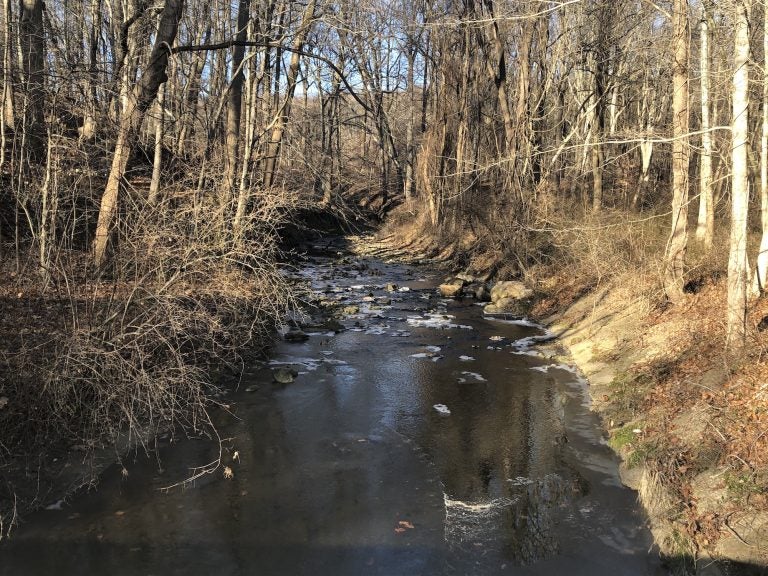Gov. Carney, lawmakers propose $50M for Delaware Clean Water Trust
Previous efforts to improve water quality would have levied a fee on households and businesses. They failed. Now, Gov. Carney is putting the proposal in the capital budget.

Pike Creek near Newark. Officials says the Clean Water Trust would pave the way for cleaner drinking water, improved stormwater runoff and higher-quality waterways. (Cris Barrish/WHYY)
In Delaware, the Carney administration is taking steps to inject $50 million dollars into improving water quality in the low-lying state.
It’s the latest effort to ensure clean water to residents, especially those who have contaminated wells and septic systems or suffer from stormwater runoff. Previous attempts by Carney’s predecessor, Jack Markell, and lawmakers to levy a fee on households and businesses failed.
Carney was flanked by lawmakers and leaders of environmental groups in Dover on Tuesday as he announced the proposed Clean Water Trust. His budget for the 2021 fiscal year will include $50 million to a revolving loan fund. He said low- income communities will be targeted for assistance.
“There’s a big difference between living where I do in the city of Wilmington, with the water utility and the wastewater utility that have thousands, tens of thousands of customers to pay for those facilities and an engineering department and all of that,’’ Carney said, “compared to a mobile home park in rural Sussex County or a remote farmhouse in rural Sussex County.”
The proposal includes an annual strategic planning process to ensure that the underserved get access to public water and sewer systems, as well as infrastructure to reduce stormwater runoff. The money will be included in the state’s capital budget, known as the Bond Bill.
Democrat Carney predicted approval from the Democrat-controlled General Assembly, with the governor noting that many of the water issues are in rural communities in Kent and Sussex counties represented by Republicans.
Attending Tuesday’s announcement was Republican Rep. Mike Ramone of Pike Creek in New Castle County, who said he liked what he heard but wanted to hear more before deciding whether to support the initiative. Noting that the state’s revenues are up this year, Ramone said he’d like to “return some money to taxpayers.”
Anne Harper, who heads the Delaware Nature Society, said the initiative is long overdue. She said some money could go to improving the quality of waterways used for fishing and recreation.
“Not every person in the state of Delaware does have access to clean, potable drinking water, or to stormwater management systems that keep their homes from flooding or their neighborhoods from flooding,’’ Harper said.

“This is an opportunity to address those needs,” she added. “We hope to see infrastructure projects that ensure that every resident has access to clean water in their home, clean drinking water, that we have good flood control and management.”
Dr. Kara Odom Walker, secretary of the state Department of Health and Social Services said targeting poorer communities is critical.
“It’s not just about those communities who are well-organized and have the best and brightest engineers working on projects,’’ she said. “We also have to make sure we’re looking to communities that don’t have the same resources. [The] state really does need to play a strong role in looking at those distressed and underserved communities as well.”
Rick Duncan, executive director of the Delaware Rural Water Association, agreed.
“Having this type of resource of funding will play a vital role in our small community water systems that are having difficulty seeking those funds to support infrastructure needs and maintain compliance,’’ Duncan said.
WHYY is your source for fact-based, in-depth journalism and information. As a nonprofit organization, we rely on financial support from readers like you. Please give today.





